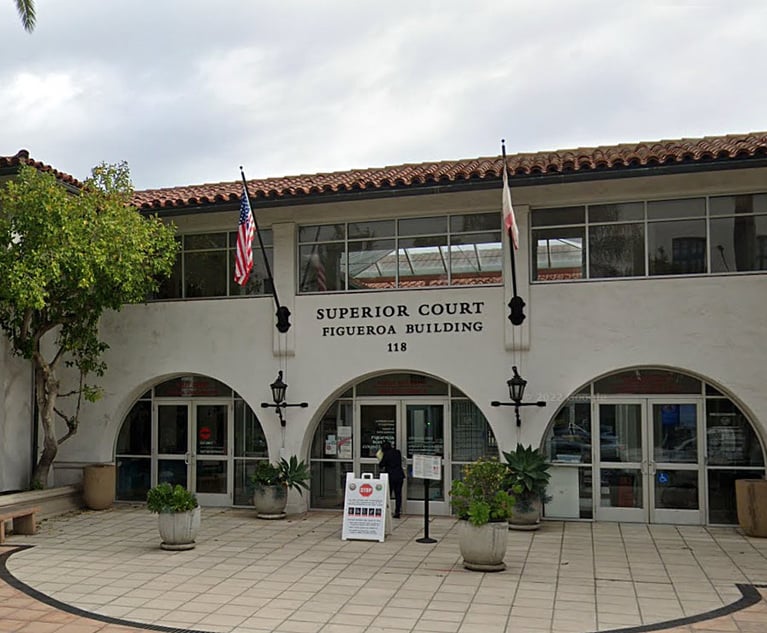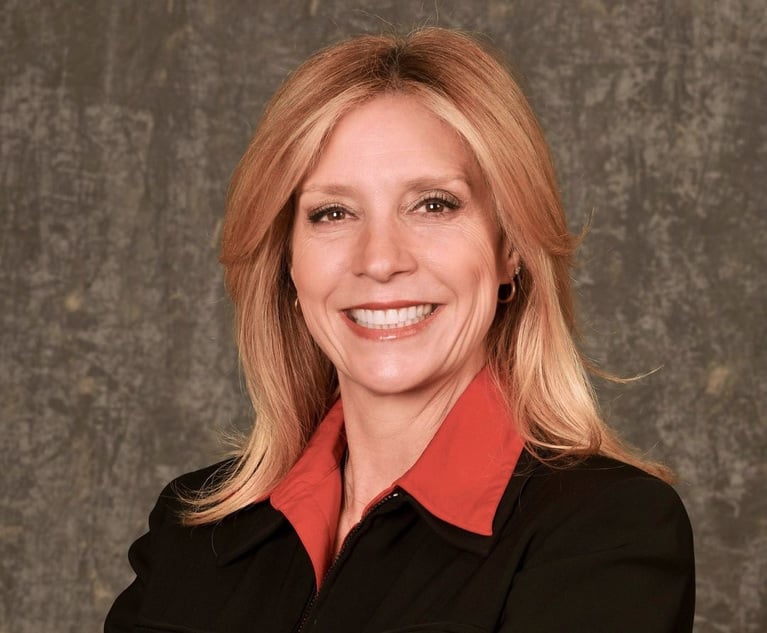 Jesse Miller, partner at Reed Smith. (Courtesy photo)
Jesse Miller, partner at Reed Smith. (Courtesy photo)'A Deep Sense of Duty and Conviction': Reed Smith Partner Discusses National Guard Coronavirus Deployment
Jesse Miller's unit was deployed in March and, for the past two months, the Big Law partner has been helping communities in California impacted by the coronavirus pandemic.
May 20, 2020 at 08:00 AM
8 minute read
Across Big Law, lawyers are doing what they can to help their clients, coworkers and communities navigate the realities of the coronavirus pandemic, which has left hundreds of thousands sick, shut down most of the country and hurt the economy.
For Reed Smith's Jesse Miller, a San Francisco-based litigator and partner in the firm's global commercial disputes group, the contributions have been more boots on the ground. Miller is also a decorated colonel in the Army National Guard. After being deployed March 17, he and his unit have spent the last two months helping vulnerable Californians at food banks, nursing homes and more.
Via email, The Recorder caught up with Miller, who also leads Reed Smith's veteran inclusion group, to learn more about what his past few months have looked like and how his firm has been supporting him during his time away from his practice. The following has been edited for clarity and length.
You've been deployed for more than two months now, and I imagine your life is looking pretty different lately. Can you talk about what your average day looks like now?
No day is really the same, and my leadership role has evolved over time and with the mission. What has been consistent is how special and rewarding this mission is. We are working side-by-side with our interagency partners, counties and neighbors to protect Californians in the fight against COVID; we are saving lives and mitigating broader harms. It's truly been the most important mission of my military career.
Our first missions focused on supporting food banks to ensure the food supply chain was not disrupted and to protect California's most vulnerable population, providing critical medical support to COVID isolation hospitals and medical sites. Over the first 10 days of the operation, our operations expanded to include more than 10 food banks, multiple medical sites, medical warehouse support for [the Emergency Medical Services Authority] and medical screening and homeless shelter support. We established multiple federal medical stations in at-risk communities, which was accomplished by flying Air National Guard teams around the state in C130 aircraft.
In late March, I took on a new role as the Deputy Commander for Joint Task Force – Domestic Support, which is the task force in charge of the California National Guard's civil support response statewide. One of our first big operations involved the California Nation Guard helping other states. In early April, we loaded ventilators onto C130's from the California Air National Guard to help our fellow citizens in New York, New Jersey and Illinois.
Much of my duties center around interagency coordination with local emergency management personnel and public health officials. I've learned a great deal while also leveraging my 28-plus years of military experience and my 25 years of legal experience tackling complex problems and finding solutions, often in time-constrained environments and pressure-filled, high-stakes situations, for my clients.
What is some of the work you've done that really stands out?
One of the most novel and rewarding missions I've played a role in is leading, planning, coordinating and overseeing execution for the deployment of our Regional Medical Strike Teams to Skilled Nursing Facilities. This was a new type of mission for all of us, and we've been able to provide critical support and a bridging solution for Skilled Nursing Facilities. In the early days of getting the operation off the ground, we would have calls and meetings and planning sessions at all hours to get things done rapidly, but safely too, to protect our force and to ensure we could help. I was honored to interact with senior Cal OES emergency management leadership, the California Department of Public Health, interagency team members and senior LA County officials. It was truly special because we all maintained a shared sense of purpose: taking care of Californians.
The true heroes in this operation are the brave medical personnel and servicemen and women working in the Skilled Nursing Facilities every day. Many of the team members are young medics or med techs (similar to EMTs on the civilian side), several of whom only last year graduated from their basic training school.
As you've transitioned away from lawyer and civilian life, what's been challenging as you adjust to your new normal?
In the early days of the mission, I had to devote nearly 100% of my attention to mission accomplishment: taking care of my Soldiers, ensuring operational efficacy and supporting our communities. There was no question in my mind: when I was called to duty, I left. That's my job as an Army leader, but I also felt a deep sense of duty and conviction in the mission—California needed the Guard's help.
That said, I knew I had a great team at Reed Smith backing me up, particularly the core team of folks that I work with daily, and have for many years. I know they would hold down the fort until I returned, whenever that was. In my spare moments, I made sure to reach out to my clients to make sure they knew their needs would be addressed and that I could be reached if needed 24/7. That's really not so different than my normal civilian practice. Less sleep and no "white space" was certainly a new normal, but we were are at war against a deadly virus, and I was good with the sacrifice. To a person, my clients and partners were 100% supportive, and that was very reassuring.
As time has progressed, I've found a bit more time to ensure availability to my Reed Smith teammates and clients to make sure we stayed on track operationally and strategically with our cases and their needs. I love my job as a trial lawyer, strategic adviser and problem-solver, so I miss the work quite a bit. For now, duty called, but I do look forward to getting back to leading trial teams and my client work on a daily basis.
The biggest challenge has been being away from my family in San Francisco—my wife, Katya, and my children Nick, 16, and Vivian, 13. During other deployments, I've been overseas and truly away with my entire unit, but during this mission, I am still home in California but away from them, so it is harder. As a family, we decided that due to the dangers and risks of COVID, I would not go home. So, we had to get by with celebrating Nick's birthday via Zoom, and a couple of quick, socially distant visits with me down the front porch steps and them at the doorway. It's been a challenge.
That said, "staying at home" has been hard for all Californians, and Katya has been a hero leading the family on the home front and keeping things on track there without my presence or availability to provide much support. She is the hero in all of this, and she's done it before during my deployments. It's definitely given me cause to reflect on how much our families sacrifice to enable what we in the military do. It's truly remarkable.
How has your firm supported you as you shifted from legal work to deployment?
Reed Smith has been great. My teammates and management have given me the support, freedom and reassurance to focus on the mission. It's the most important fight that anyone in my generation has prosecuted, and I feel that as a nation we see ourselves as being in this together. I know we all see this fight as being larger than any one of us. That's why I joined the Army in 1991 and continue to serve today: to contribute to a cause that is bigger than me. It is how I serve and give back to my country, and I know my firm respects that.
As with past deployments—including Hurricane Katrina in New Orleans and Kosovo—the firm has my back. When I departed on moment's notice, I did so knowing that my firm was behind me. My experiences as a soldier make me a stronger advocate and well-rounded lawyer, and my experiences as a lawyer have made me a better Army leader, particularly in the joint interagency, intergovernmental, civil support environment I'm operating in now. I know when I come off mission, I will be an even more effective partner and lawyer for Reed Smith and my clients. Duty, tenacity, innovation, passion and perseverance are fundamental crossover qualities that apply to both my legal work and Army profession.
This content has been archived. It is available through our partners, LexisNexis® and Bloomberg Law.
To view this content, please continue to their sites.
Not a Lexis Subscriber?
Subscribe Now
Not a Bloomberg Law Subscriber?
Subscribe Now
NOT FOR REPRINT
© 2024 ALM Global, LLC, All Rights Reserved. Request academic re-use from www.copyright.com. All other uses, submit a request to [email protected]. For more information visit Asset & Logo Licensing.
You Might Like
View All

Santa Barbara Judge Accused of Moonlighting as Attorney for Secretary/Girlfriend
4 minute read
Insurers Dodge Sherwin-Williams' Claim for $102M Lead Paint Abatement Payment, State High Court Rules
Trending Stories
Who Got The Work
Michael G. Bongiorno, Andrew Scott Dulberg and Elizabeth E. Driscoll from Wilmer Cutler Pickering Hale and Dorr have stepped in to represent Symbotic Inc., an A.I.-enabled technology platform that focuses on increasing supply chain efficiency, and other defendants in a pending shareholder derivative lawsuit. The case, filed Oct. 2 in Massachusetts District Court by the Brown Law Firm on behalf of Stephen Austen, accuses certain officers and directors of misleading investors in regard to Symbotic's potential for margin growth by failing to disclose that the company was not equipped to timely deploy its systems or manage expenses through project delays. The case, assigned to U.S. District Judge Nathaniel M. Gorton, is 1:24-cv-12522, Austen v. Cohen et al.
Who Got The Work
Edmund Polubinski and Marie Killmond of Davis Polk & Wardwell have entered appearances for data platform software development company MongoDB and other defendants in a pending shareholder derivative lawsuit. The action, filed Oct. 7 in New York Southern District Court by the Brown Law Firm, accuses the company's directors and/or officers of falsely expressing confidence in the company’s restructuring of its sales incentive plan and downplaying the severity of decreases in its upfront commitments. The case is 1:24-cv-07594, Roy v. Ittycheria et al.
Who Got The Work
Amy O. Bruchs and Kurt F. Ellison of Michael Best & Friedrich have entered appearances for Epic Systems Corp. in a pending employment discrimination lawsuit. The suit was filed Sept. 7 in Wisconsin Western District Court by Levine Eisberner LLC and Siri & Glimstad on behalf of a project manager who claims that he was wrongfully terminated after applying for a religious exemption to the defendant's COVID-19 vaccine mandate. The case, assigned to U.S. Magistrate Judge Anita Marie Boor, is 3:24-cv-00630, Secker, Nathan v. Epic Systems Corporation.
Who Got The Work
David X. Sullivan, Thomas J. Finn and Gregory A. Hall from McCarter & English have entered appearances for Sunrun Installation Services in a pending civil rights lawsuit. The complaint was filed Sept. 4 in Connecticut District Court by attorney Robert M. Berke on behalf of former employee George Edward Steins, who was arrested and charged with employing an unregistered home improvement salesperson. The complaint alleges that had Sunrun informed the Connecticut Department of Consumer Protection that the plaintiff's employment had ended in 2017 and that he no longer held Sunrun's home improvement contractor license, he would not have been hit with charges, which were dismissed in May 2024. The case, assigned to U.S. District Judge Jeffrey A. Meyer, is 3:24-cv-01423, Steins v. Sunrun, Inc. et al.
Who Got The Work
Greenberg Traurig shareholder Joshua L. Raskin has entered an appearance for boohoo.com UK Ltd. in a pending patent infringement lawsuit. The suit, filed Sept. 3 in Texas Eastern District Court by Rozier Hardt McDonough on behalf of Alto Dynamics, asserts five patents related to an online shopping platform. The case, assigned to U.S. District Judge Rodney Gilstrap, is 2:24-cv-00719, Alto Dynamics, LLC v. boohoo.com UK Limited.
Featured Firms
Law Offices of Gary Martin Hays & Associates, P.C.
(470) 294-1674
Law Offices of Mark E. Salomone
(857) 444-6468
Smith & Hassler
(713) 739-1250







